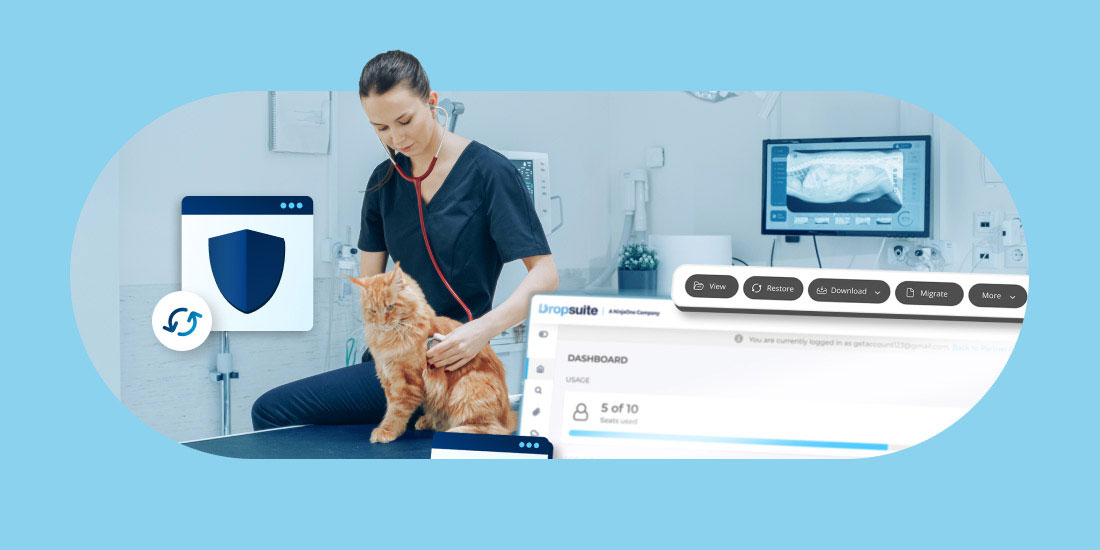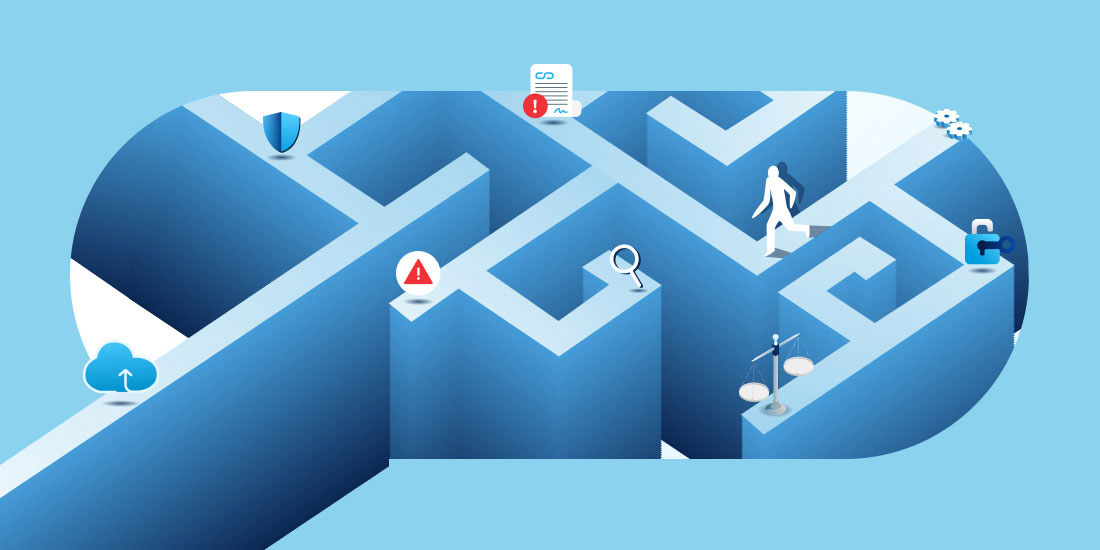Estimated Reading Time: 4 Minutes
Veterinary clinics play an essential role in preserving the health and well-being of animals, often using advanced technologies like record management software, scheduling platforms, diagnostic systems, and telemedicine solutions. However, these digital solutions bring unique challenges, especially regarding data security and compliance.
Even one of the largest networks of veterinary hospitals globally, National Veterinary Associates (NVA), was vulnerable to a ransomware attack in 2019, underscoring the critical need for robust cybersecurity measures in the veterinary industry.
As veterinary clinics increasingly rely on Managed Service Providers (MSPs) to maintain their IT infrastructure, MSPs play a critical role in ensuring that these practices comply with regulations, protect sensitive data, and maintain operational continuity. MSPs must understand the unique challenges of veterinary practices to provide tailored solutions.
Key Regulations and Compliance Considerations
Veterinary clinics must navigate a variety of veterinary laws and regulations, both federal and state-specific, to maintain compliance and protect sensitive client data.
Health Insurance Portability and Accountability Act (HIPAA)
Although HIPAA does not directly cover animals’ health records, it does apply to veterinary client information. For example, pet owners’ personal data—such as names, addresses, and contact information—is protected under HIPAA’s rules for electronic protected health information (ePHI).
Key HIPAA requirements include:
- Confidentiality and Integrity: Ensure all ePHI is secure from unauthorized access or alteration.
- Availability: Maintain access to ePHI in case of an emergency or system failure.
- Training: Educate staff on best practices for handling protected information.
For MSPs, this means implementing advanced security measures such as encryption, multi-factor authentication, and regular security audits to help veterinary practices stay compliant.
General Data Protection Regulation (GDPR)
For veterinary clinics operating in or serving clients from the European Union, GDPR is critical. This regulation applies to all personally identifiable information (PII) collected, stored, or processed by the clinic, including veterinary client data.
Key GDPR considerations:
- Consent: Obtain clear, specific consent before collecting client data.
- Transparency: Provide a detailed privacy policy.
- Right to be Forgotten: Allow clients to request data deletion.
- Data Breach Protocols: Implement a plan for detecting, investigating, and reporting breaches.
MSPs can assist by deploying GDPR-compliant systems, managing data access policies, and ensuring breach detection protocols are in place.
Controlled Substances Act (CSA)
Veterinary clinics often handle controlled substances for animal treatment. The DEA (Drug Enforcement Administration) enforces the CSA, requiring veterinarians to:
- Maintain accurate records of controlled substances received, stored, and dispensed.
- Securely store controlled substances to prevent theft or misuse.
- Comply with state-specific controlled substance laws, which may have additional requirements.
MSPs can support compliance by ensuring secure digital record-keeping systems and integrating access controls for authorized personnel.
Federal Trade Commission (FTC) Act
Veterinary practices must comply with the FTC Act to avoid:
- Misleading advertising or promotional claims, especially related to treatments or medications for animals.
- Claims unsupported by scientific evidence, particularly in marketing alternative therapies or supplements.
MSPs should monitor digital platforms for compliance and provide secure storage for marketing data to ensure accuracy and protection.
Food and Drug Administration (FDA) Compliance
Veterinarians must follow FDA guidelines for:
- Prescription drug use in animals, including extra-label drug use (ELDU), which must comply with FDA’s Animal Medicinal Drug Use Clarification Act (AMDUCA).
- Ensuring animal food is safe, properly labeled, and free from harmful residues if the animals are part of the food supply chain.
MSPs can help by implementing systems for tracking and reporting compliance data efficiently.
Anti-Referral Laws: Stark Law and Anti-Kickback Statute (AKS)
If a veterinary practice refers clients for services like diagnostics or surgery, compliance with anti-referral laws is necessary to avoid conflicts of interest and ensure ethical practices. These laws are particularly relevant if the practice is part of a larger healthcare organization.
Consumer Protection Laws
State and federal laws, such as those governing fair pricing, client rights, and informed consent, may apply. Veterinarians are responsible for disclosing the risks and benefits of treatments and medications. MSPs can support by providing digital tools that ensure transparency and streamline client communication.
Modern Threat Landscape for Veterinary Practices
Veterinary clinics are increasingly targeted by cybercriminals due to the sensitive data they manage. Common threats include:
- Ransomware: Encrypts data and demands payment for its release.
Example: In 2021, the Animal Hospital of Pensacola in Florida suffered a ransomware attack that encrypted their data, rendering it unusable. Fortunately, the hospital had data backups on a secondary server, allowing them to resolve the problem internally without paying the ransom. - Phishing: Deceptive emails trick staff into revealing credentials or clicking malicious links.
- Accidental Deletions: Employee errors can lead to significant data loss without proper backup solutions.
For MSPs, managing cybersecurity for veterinary clinics means deploying advanced threat detection systems, regular security audits, and comprehensive employee training programs.
Data Backup and Archiving Solutions for Veterinary Clinics

The AVMA emphasizes the importance of secure, offsite backups. Here’s how MSPs and Dropsuite can help veterinary practices achieve peace of mind:
Comprehensive Data Backup
- Protect critical data such as emails, schedules, diagnostic records, and invoices.
- Automate secure backups to mitigate risks associated with human error.
Advanced Security Features
- Multifactor Authentication (MFA): Prevent unauthorized access to backups.
- Encryption: Ensure all backed-up data is securely stored and transferred.
- Ransomware Protection: Quickly restore data to pre-attack conditions without paying ransoms.
Compliance Support
- Stay compliant with HIPAA, GDPR, and other specific regulations.
- Implement eDiscovery tools for audits, investigations, and legal proceedings.
Scalability
- Dropsuite’s solutions grow with your practice, ensuring long-term business continuity and operational resilience.
No Long-Term Contracts or Complicated Billing
- Enjoy the flexibility of month-to-month contracts tailored to your business needs.
Why Choose Dropsuite?
Dropsuite empowers MSPs to deliver:
- Automated Backup: Ensure all data is regularly and securely backed up.
- Archiving for Compliance: Meet legal requirements with easy-to-use journaling and archiving features.
- Rapid Recovery: Minimize downtime with quick restoration of critical systems and data.
By partnering with Dropsuite, MSPs can confidently support veterinary practices in navigating compliance challenges, mitigating cyber threats, and ensuring business continuity.
Talk to our experts today to discover how Dropsuite can enhance your veterinary IT solutions. Additionally, we offer MSPs access to a free trial of NFR (Not for Resale) licenses to test Dropsuite within your own organization.






